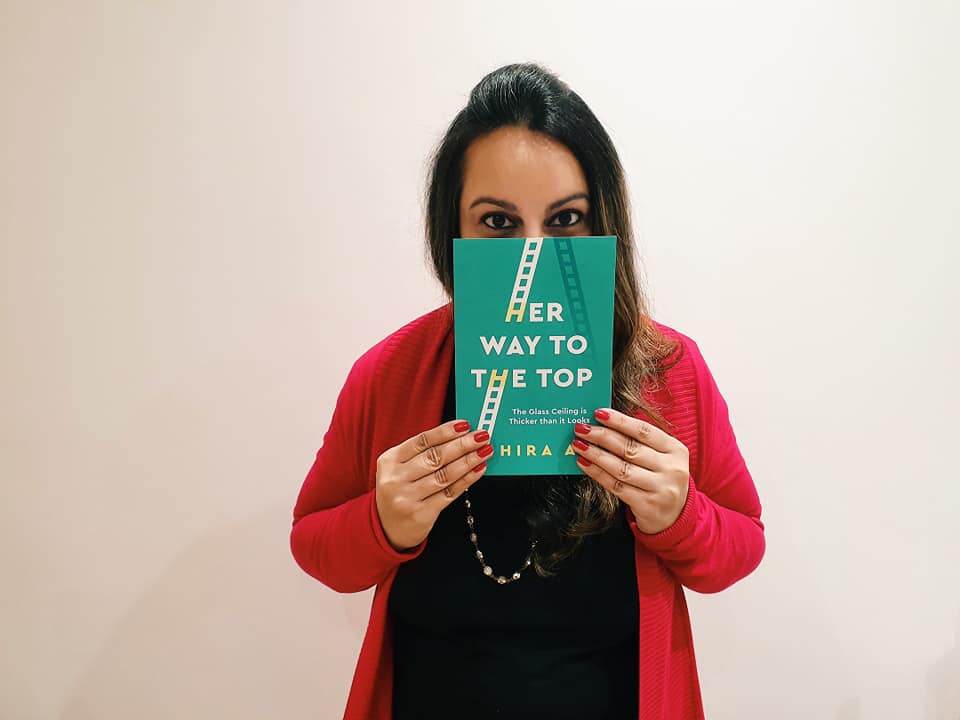Contacts
To advertise with British Muslim magazine, our website and email newsletters, email Robyn
Having problems with your subscription?
Email:
[email protected]
To contact the editor email
[email protected]
Hira Ali, Business Woman, CEO and Author of ‘Her Way to the Top’ talks to our Features Writer about the Internal Challenges of Imposter Syndrome and the fears that branch out from this fear.

Hira has trained many women across the globe, having started her career in Pakistan. Founder of ‘Advancing Yourself Potential’ and ‘International Women Empowerment Events,’ Hira has been working on many successful projects throughout Asia, Europe and the United States. Her debut book launch of “Her Way to the Top” gets a firm grip on smashing the glass ceiling. We managed to catch up at the Southbank Centre in London to find out how she managed to smash her way to the top.
Tell me about your transition to the UK, your business ventures and your new book?
I moved to London from living a luxurious life in Pakistan and UAE; I wouldn’t have dared to relocate on my own, every time I moved, it was because my husband wanted to move for better career prospects. However, these moves really helped my career too.
When I moved to London, nearly four years ago, my husband recommended that I should start writing and podcasting. My articles were featured in top media publications such as The Huffington Post, Forbes Women, Entrepreneur and many more. By that time I had started to realise that women were facing internal and external challenges, not just in Asia, but globally. I conducted a survey to confirm this and launched the result and my book Her Way to the Top; a guide to smashing the glass ceiling was published by Panoma Press last year. Since then, the book has received lots of media coverage.
Last year, I partnered with some amazing business women and launched Career Excel, an online women in leadership program, followed by The Grey Area, a survey which captures the experience of ethnic minorities working in public and private sector. During my book research, I made an interesting discovery. Many of the internal challenges women face are similar to those that minorities face, including impostor syndrome, FOMO (fear of missing out), minority stress, perfectionism, stereotype threat, inability to self-promote and step up, fear of failure, fear of judgement, and fear of vulnerability. Last year, I also launched International Women Empowerment Events (IWEE) in the Maldives. The objective of this initiative is to support Asian countries in closing the gender gap. This year we had hoped to launch in the Dubai and Pakistan but we may now be having virtual conferences instead.
I found the concept of ‘FOMO’ (fear of missing out) really interesting, give me a snapshot about this that you talk about in your new book?
Asian and Middle Eastern women noted that FOMO was one of their biggest challenges. In fact, FOMO was the number one challenge reported by women across all regions, especially working mothers who feared missing out on the responsibilities of their different roles, be it wife, mum, working/businesswoman, daughter or friend. It primarily involves work-life balance and the fear of not meeting expectations, whether at work, at home or both. I particularly found that with Asian women, other than FOMO, their challenges were more external and had more to do with misogynist work environment, work-place harassment and lack of infrastructure. I do believe that by forming stronger bonds and cohesive communities that support each other, whether we are based in Asia or internationally, Asian women help each other in surviving and overcoming these challenges as we truly are ‘in this together.’
For female empowerment to work in Asia, we however do need to steer away from blaming religion and instead fight the patriarchal mind-set embedded in our social and cultural conditioning . I often see many judgements being passed on women when in reality our religion holds both men and women equally responsible for their actions.
How do you see the role of women from a religious viewpoint?
People usually have the misconception that Muslim women are subservient and subdued.
However, if we look at this historically, we know that Islam gave rights to women 1400 years ago and (Hazrat Ayesha) and our Prophet (pbuh) shared a very exemplary relationship based on reciprocity, love and respect. The fact that Prophet helped Hazrat Ayesha in household chores, often drank from the same cup, and even raced each other, is indicative of their strong bond.
In Islam, the role of women is elevated and empowered. I have often shared with non-Muslim friends about the rights and status given to a woman in Islam centuries ago. Some of these rights included guaranteeing women’s rights of inheritance and to own and manage property. Women were granted the right to live in the matrimonial home and receive financial maintenance during marriage. Women also maintain the right to retain their own earnings without any obligation so share the same. Our Prophet (pbuh) came along and changed so many things for women including prohibition of female infanticide and even non-Muslim women see the respect and wisdom in this.
Many non-Muslims are surprised when they find this out and acknowledge how little they knew about Islam. I guess it’s a gradual process of changing perceptions to be honest and that can only be achieved by creating awareness and dialogue.
What are your internal challenges?
(Laughs) Learning to say no, I am still working on that, as we don’t want to appear impolite and are conditioned to be people pleasers. If it is not adding value, you have to learn to say no, if you don’t then you will struggle to keep up. You don’t have to say it rudely but being firm is important. Our internal challenges such as imposter syndrome trigger other barriers such as perfectionism, fear of self-promoting, fear of vulnerability and so on. It is fascinating to see how intertwined many of these challenges are and most of these internal ones have been fuelled by external biases and social conditioning.
We all need to be creating healthy boundaries for ourselves, the absence of which can cause us stress and intense time poverty. Once we master our internal challenges then we can go ahead and fight/ conquer the external challenges. Since I moved my business from one country to another, apart from determination and resilience, another factor that has really helped me is not being afraid of failures and my openness to vulnerability.
Interview – Tahira Khan
Contact her on Twitter, LinkedIn, Instagram or Facebook or email You can buy her book here: Her Way To The Top: A Guide to Smashing the Glass Ceiling.
